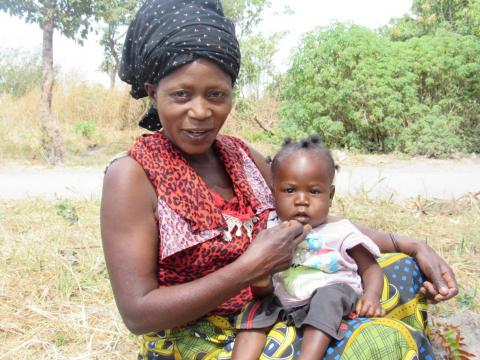Hope at last for Astrida

By Mutinta Chiseko - Donor Liaison Manager, Zambia
What started as a normal childhood for 17-month-old Astrida of World Vision’s Buyantanshi Area Programme (AP) in northern Zambia, almost ended as a nightmare.
Astrida is the third born in a family of three. She lives in a remote village with her 48-year-old grandmother Rhoda, five cousins and two siblings, ages five and seven. Unlike many children born in remote, vulnerable areas in rural Zambia, Astrida beat the odds. She was healthy at birth and weighed four kilograms. While she was strong and in good physical shape, her 26-year-old mother was battling with fibroids, a non-cancerous growth in the uterus, which left her weak and bedridden most of the time.
Due to her mother’s ill health, baby Astrida was weaned off breast milk at three months, which is about 21 months before the recommended age. She was still fragile and not ready for solid foods. Her grandmother, a peasant farmer who was looking after seven other young children, had no choice but to feed her alternative fluids.
“I started giving her drops of soy milk and water, but she was always crying - her health started going down. I even tried breastfeeding her myself but it didn’t help”, says Rhoda. Sadly, when Astrida was five months old, her mother passed away leaving her and her siblings orphaned. “I lost all hope when her mother died. I had no choice but to introduce her to solid foods”, Rhoda says.
By seven months, Astrida’s health had deteriorated, and she was weak and sickly. “She was so thin. Her eyes were pearl and hair brownish. The hospital said it was malnutrition. I was scared and thought we would lose her just like her mother”, says Rhoda.
Fortunately, one day while visiting their local clinic, Rhoda was linked to a group of community health workers trained by World Vision. The community health workers helped her to understand malnutrition and how it can be treated and prevented. Astrida was enrolled on a 12-day extensive feeding programme called Positive Deviance/Hearth (PD/Hearth), facilitated by World Vision. During the programme, the children underwent intense feeding using locally available foods. Astrida was weighed before and after 12 days, while Rhoda was taught how to prepare nutritious meals using local products.
Incredibly, Astrida made steady progress during the session. “The programme came to our rescue”, Rhoda says. “Astrida’s health started improving. Her weight increased from 6.2kg to 6.8kg [1.32 lbs] and she was looking alive and bright,” says Rhoda.
“I was actually shocked by her progress. I never, ever thought that she would be able to stand, walk or play like other children her age,” Rhoda adds with happy tears, rolling down her cheeks. “I am very grateful to World Vision for bringing this amazing programme to our community. We have learned a lot. I can now prepare a variety of meals using different foods we grow. My whole family is now healthier.”